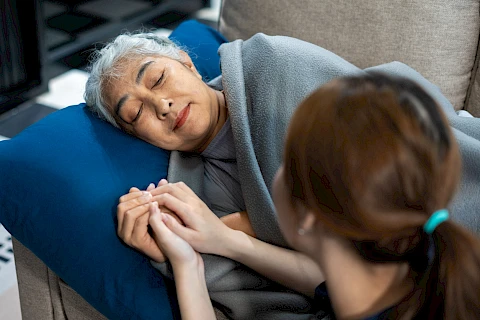
Sleep is an essential part of maintaining good health, especially for seniors. As we age, our sleep patterns change, which can impact our overall well-being. Caregivers play a big role in ensuring that seniors get the rest they need. Senior Helpers will provide strategies to help caregivers promote healthy sleep for seniors in their care.
Sleep Needs in Seniors
As people age, they often experience changes in how and when they sleep. Seniors may find it harder to fall asleep or stay asleep, leading to less restful nights. Each senior has unique sleep needs. While some may require more sleep, others may need less. Understanding these individual needs is the first step toward improving sleep quality.
Creating a Sleep-Friendly Environment
A sleep-friendly environment can make a significant difference in the quality of a senior's rest. Here are some tips for optimizing bedroom conditions:
- Adjust the temperature to a comfortable level, usually cooler at night.
- Ensure the room is dark by using blackout curtains.
- Reduce noise by minimizing disruptions and using white noise machines if necessary.
- Provide comfortable bedding and sleepwear that suits the senior's preferences.
Having a regular sleep schedule can greatly improve sleep quality for seniors. Bedtime routines signal to the body that it's time to wind down. Caregivers can suggest calming activities, such as reading a book or listening to soothing music.
Engaging in gentle stretching or yoga can also be beneficial. Seniors should always consult a doctor before starting a new fitness routine. Avoid electronic screens at least an hour before bedtime, as the blue light can interfere with the body's natural sleep-wake cycle.
Managing Sleep Disturbances
Many seniors face sleep disturbances like insomnia or sleep apnea. Insomnia can be addressed by implementing better sleep hygiene practices, while sleep apnea might require medical consultation.
Caregivers should encourage seniors to speak with healthcare professionals if they experience persistent sleep issues. Promoting stress-reducing activities like meditation or deep-breathing exercises can also help. Keeping a sleep diary to identify patterns or triggers of poor sleep can be a useful tool in addressing these disturbances.
The Role of Diet and Exercise in Sleep Quality
Nutrition and physical activity also play vital roles in sleep quality. A balanced diet can contribute to better sleep, while certain foods close to bedtime, like caffeine and heavy meals, can be disruptive. Regular exercise can improve sleep, but it's essential to do it properly. Caregivers should encourage exercises like walking or swimming during the day, but avoid vigorous activity too close to bedtime.
Quality sleep is important for both physical and mental health. Adequate rest improves mood, enhances cognitive function, and supports the immune system. Conversely, poor sleep can lead to risks such as increased falls, depression, and cardiovascular issues. For caregivers, understanding this connection reinforces the importance of promoting healthy sleep.
Contact Senior Helpers for Support With Sleep for Seniors
Promoting healthy sleep in seniors involves creating a sleep-friendly environment, establishing bedtime routines, and addressing disturbances. Proper diet and exercise also support better sleep quality, which is integral to a senior's health.
Caregivers are encouraged to implement these strategies to enhance the well-being of seniors in their care. For more professional support with senior care, contact us at Senior Helpers.